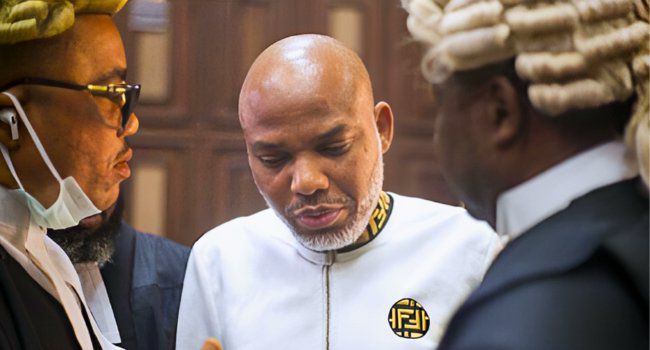Nnamdi Kanu's lawyer claims IPOB leader's threats mere boasts, FG disagrees

```html Kanu's "Boasts" Under Scrutiny: FG and Defense Clash Over IPOB Leader's Words
Abuja, Nigeria - The Federal Government (FG) and Nnamdi Kanu's legal team are locked in a dispute over the interpretation of the Indigenous People of Biafra (IPOB) leader's public statements, with the government arguing they constitute incitement and terrorism, while the defense claims they are mere boasts. The case resumed on Friday, July 18, 2025, at the Federal High Court in Abuja, presided over by Justice James Omotosho.
Defense Argues Lack of Incitement
Kanu Agabi (SAN), representing Nnamdi Kanu, presented a "no-case submission," arguing that the prosecution has failed to prove any element of the terrorism charges against his client. Agabi contended that the prosecution's evidence merely paints Kanu as a "bad man" without demonstrating a direct link between his broadcasts and specific acts of violence.
"This man (Kanu) can boast. He was just boasting. He said I can bring the world to a standstill. I don’t see anything wrong with that. You don’t prosecute a man for mere boasting," Agabi stated, emphasizing that the prosecution failed to present any witnesses who claimed to have been directly incited by Kanu's words.
FG Insists on Terrorism Charges, Cites Evidence
Prosecution counsel Adegboyega Awomolo (SAN) countered Agabi's arguments, urging the court to reject the no-case submission and compel Kanu to enter a defense. Awomolo asserted that the prosecution presented sufficient evidence, including video and audio-visual materials, linking Kanu to acts of terrorism, violence, and the alleged killing of at least 170 security officials.
Awomolo emphasized the severity of Kanu's alleged threats and the potential consequences of dismissing them as mere boasting. "Why will somebody say a terrorist, who boasted that security men and other people should be killed, should be allowed to go free?" he questioned, urging the court to consider the broader context of Kanu's statements and their impact on national security.
Expert Analysis: The Nuances of Speech and Incitement
Dr. Fatima Hassan, a Professor of Criminal Law at the University of Lagos, notes the complexities in defining the line between protected speech and incitement. "The courts must meticulously examine the intent behind the words, the context in which they were spoken, and their potential impact on the audience. The prosecution needs to demonstrate a clear and present danger resulting from Kanu's speeches to secure a conviction on terrorism charges," she explains. "The government has a duty to ensure safety, but it also has a duty to uphold free speech."
Historical Context: IPOB and the Biafran Movement
The case unfolds against a backdrop of longstanding tensions related to the Biafran secessionist movement. IPOB, under Kanu's leadership, has been a prominent voice advocating for an independent Biafran state, echoing sentiments from the Nigerian Civil War of 1967-1970. The government proscribed IPOB in 2017, classifying it as a terrorist organization, a move that has been widely debated.
Current Context: Security Concerns in the Southeast
The trial also takes place amid ongoing security challenges in Nigeria's Southeast region, with frequent reports of violence and unrest. While IPOB has denied responsibility for many of these incidents, the government maintains that Kanu's rhetoric has fueled instability. This security situation adds a layer of complexity to the legal proceedings, influencing public perception and political considerations.
The Court's Decision Looms
Justice Omotosho adjourned the case until October 10, 2025, to rule on the no-case submission. The court's decision will determine whether Kanu will be required to present a defense against the terrorism charges or if he will be acquitted.
Legal Implications and Potential Outcomes
The outcome of this trial has significant legal and political implications. A conviction could further inflame tensions in the Southeast, while an acquittal could embolden secessionist movements and potentially undermine the government's authority. "Regardless of the outcome, this case underscores the need for a comprehensive approach to addressing the underlying grievances and promoting dialogue to foster peace and stability in the region," argues political analyst, Chidi Okoro.
The legal battle over Nnamdi Kanu's words highlights the delicate balance between freedom of expression, national security, and the pursuit of justice in a complex and politically charged environment. The court's ruling is eagerly awaited and is expected to have far-reaching consequences. ```
Originally sourced from: pulse Ng
